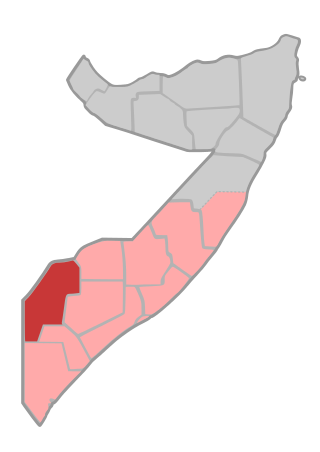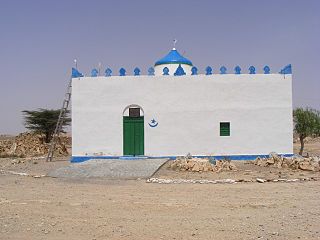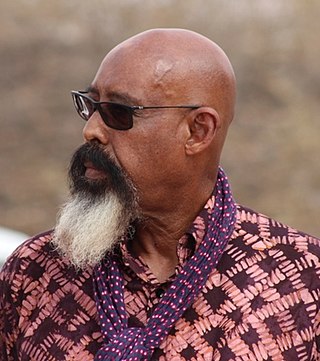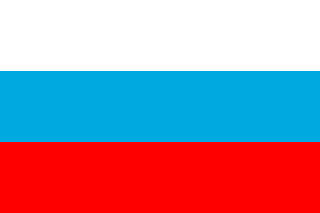Related Research Articles

The Somali Armed Forces are the military forces of the Federal Republic of Somalia. Headed by the president as commander-in-chief, they are constitutionally mandated to ensure the nation's sovereignty, independence and territorial integrity.

Gedo is an administrative region (gobol) in Jubaland, southern Somalia. Its regional capital is Garbahaarreey. It was created in 1974 and is bordered by the Ogaden in Ethiopia, the North Eastern Province in Kenya, and the Somali regions of Bakool, Bay, Jubbada Dhexe, and Jubbada Hoose further down east. The southern parts of Gedo, west of the Jubba River, used to be part of the old British Trans-Juba region during half of the seventy years of colonial era in Africa from 1890 to 1960. The British and Italians fought twice over this area. The first democratically elected governor of the administrative region was Hussein Farey, who entered office in 2008.

Kismayo is a port city in the southern Lower Juba province of Somalia. It is the commercial capital of the autonomous Jubaland region.

The Darod is a Somali clan. The forefather of this clan was Sheikh Abdirahman bin Isma'il al-Jabarti, more commonly known as Darood. The clan primarily settles the apex of the Horn of Africa and its peripheries, the Somali hinterlands up to Oromia, and both sides of the Kenya-Somalia border.
Barre Adan Shire, also known as Barre Hiiraale, Barre "Hirale" Aden Shire, or Abdikadir Adan Shire, is a former Minister of Defense of the Somali Transitional Federal Government (TFG). He was previously the TFG Minister for National Reconstruction and Resettlement. Hiiraale was also the chairman of the now defunct Juba Valley Alliance, which controlled Southern and Southwestern Somalia, including the nation's third-largest city, the strategic port town of Kismayo. During his time in office, Hiiraale presided over the country's largest autonomous area, as well as commanding an extensive militia.
The Marehan is a Somali clan, which is part of one of the largest Somali clan families, the Darod. The clan is one of the largest constituent sub-clans of the Darod. The majority of the Marehan live in the Jubaland in southern Somalia, as well as the Galguduud and Mudug regions in central Somalia, the Somali region of Ethiopia and the North Eastern Province of Kenya.
The Rahanweyn, also known as the Digil and Mirifle are a Somali clan. It is one of the major Somali clans in the Horn of Africa, with a large territory and densely populated fertile valleys of the Jubba and Shebelle rivers and the area between are mainly inhabited by settlers from the Digil and Mirifle lineages.

The Transitional National Government (TNG) was the internationally recognized central government of Somalia from 2000 to 2004.

The War in Somalia, also known as the Ethiopian invasion of Somalia or the Ethiopian intervention in the Somali Civil War, was an armed conflict involving largely Ethiopian and Somali Transitional Federal Government (TFG) forces and Somali troops from Puntland versus the Somali Islamist umbrella group, the Islamic Court Union (ICU), and other affiliated militias for control of Somalia. Ethiopian's actions were due to the ICU gaining control of a majority of southern Somalia in late 2006.

The 2006 Islamic Courts Union offensive is the period in the Somali Civil War that began in May 2006 with the Islamic Courts Union's (ICU) conquest of Mogadishu from the Alliance for the Restoration of Peace and Counter-Terrorism (ARPCT) and continued with further ICU expansion in the country. Following the outbreak of the war on December 21, 2006; by December 24, direct Ethiopian intervention in the conflict in support of the Transitional Federal Government (TFG) was no longer denied by the Ethiopian government. The Eritrean government denied any involvement despite Ethiopian claims to the contrary.
The Somali Patriotic Movement is a political party and paramilitary organization in Somalia, and a key faction in the Somali Civil War. Commanded originally Shukri Weyrah kaariye, Ahmed Omar Jess then by Aden Abdullahi Nur Gabyow, it was based in the southwestern area of the country, and had considerable influence in the leaderless country.
Following the civil war and the ensuing societal chaos, some factions managed to exert a degree of authority over certain regions of Somalia where they maintained broad, clan-based support. This allowed these factions to establish working administrations and eventually coherent states, and restored order to their regions. This occurred first in Puntland, Southwestern Somalia, Galmudug, Jubaland and finally Banadir.
The Juba Valley Alliance is a political faction of the Somali Civil War. It was the primary opponent of the Somali Patriotic Movement (SPM) and the Somali Reconciliation and Restoration Council (SRRC) vying for the control of Kismayo and the Juba River valley, the area known as Jubaland.
The Fall of Kismayo occurred on January 1, 2007, when the troops of Somalia's Transitional Federal Government (TFG) and Ethiopian forces entered the Somali city of Kismayo unopposed. It came after the Islamic Courts Union's forces faltered and fled in the Battle of Jilib, abandoning their final stronghold.

Major General Mohammed Said Hersi Morgan, also known as General Morgan or Colonel Morgan, is a Somali military and faction leader. He was the son-in-law of Siad Barre and Minister of Defence of Somalia. He hails from the Mejerteen Darood clan.
The Somali National Front (SNF) was a politico-military organization that operated in southern Somalia during the Somali Civil War and represented one of the major factions involved in the conflict.
Many factions opposed to Siad Barre set aside tribal and political differences to unite in purpose to overthrow his regime. After the collapse of Siad Barre's government in 1991 the nation fell into a long period of increasingly chaotic conflict between forces of clans, militias, warlords, separatist, religious functions and rebellion movements, other nations, and even the United Nations peacekeepers.
Over the course of the Somali Civil War, there have been many revolutionary movements and militia groups run by competing rebel leaders which have held de facto control over vast areas within Somalia.

Azania, officially the Republic of Azania, was a self-proclaimed autonomous state of Jubaland in southern Somalia that existed from 2011 to 2013. A group of Somali politicians proclaimed the creation of Azania on 3 April 2011 in Nairobi, with Mohamed Abdi Mohamed as its President. The state's main intentions were to contest al-Shabaab, which largely controlled Jubaland.

Jubaland, the Juba Valley or Azania, is a Federal Member State in southern Somalia. Its eastern border lies 40–60 km (25–35 mi) east of the Jubba River, stretching from Gedo to the Indian Ocean, while its western side flanks the North Eastern Province in Kenya, which was carved out of Jubaland during the colonial period.
References
- ↑ "Somalia Assessment, Version 4, September 1999, Country Information and Policy Unit". Country Information & Policy Unit, Immigration & Nationality Directorate, Home Office, UK. September 1999. Retrieved 2007-01-03.
- ↑ "Somalia: Main Political Organizations". Mudug.com. Archived from the original on 2006-09-27. Retrieved 2007-01-03.
- ↑ Footnotes to History: G to J Archived 2016-03-03 at the Wayback Machine Footnotes to History
- ↑ Somalia Assessment, September 1999 Country Information and Policy Unit, Immigration & Nationality Directorate, Home Office, UK
- ↑ "Somalia". World Statesmen. Archived from the original on 9 February 2006. Retrieved March 9, 2006. - also shows Italian colonial flag & links to map